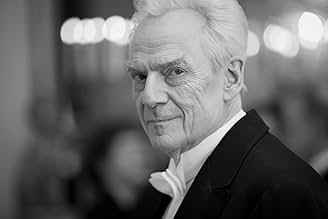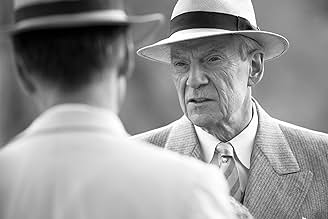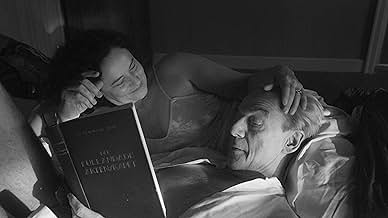IMDb-BEWERTUNG
6,2/10
862
IHRE BEWERTUNG
Füge eine Handlung in deiner Sprache hinzuA story based on the life of journalist Torgny Segerstedt, who alerted the Swedish public to the threat of Fascism in the 1930s.A story based on the life of journalist Torgny Segerstedt, who alerted the Swedish public to the threat of Fascism in the 1930s.A story based on the life of journalist Torgny Segerstedt, who alerted the Swedish public to the threat of Fascism in the 1930s.
- Auszeichnungen
- 3 Gewinne & 7 Nominierungen insgesamt
Handlung
WUSSTEST DU SCHON:
- WissenswertesThis is the second movie in which Jesper Christensen and Pernilla August are parts in a wife-husband-mistress triangle. Here Pernilla August is the mistress, in Drabet (2005) she was the wife.
- PatzerIn the movie at a party which is supposed to take place 1938 the swedish song "Hur har du det med kärleken idag?" is played and also sung by the character Maja Forssman. This song is from 1945 and was then made popular by the famous swedish artist Ulla Billquist.
- SoundtracksFinlandia
Written by [nm=0006292]
Ausgewählte Rezension
The key to this film lies, in part, in understanding the meaning of the title. "The Last Sentence" is an ambiguous translation of the Swedish because a "last sentence" might refer to the last words a man writes. Instead, "sentence" here means the "judgment" one passes on a man who has died--a judgment that endures longer than the judgments that were passed on a man while he was alive.
And this citation of the "Hávamál" (an Old Norse 13th-century poem) has a special resonance in light of a toast proposed by Torgny Segerstedt early in the film: Segerstedt remarks something to the effect that we have a sacred duty to tell the truth in public matters, but no such duty in our private affairs.
Jan Troell has thus given us a portrait of Torgny Segerstedt as a man who fiercely refused to say anything other than the truth about Hitler and Nazism, but who, at the same time, was incapable of acting in a truthful and caring fashion in his private life--a man who seemingly had a deeper attachment to his dogs than to any of the people who deeply loved him.
And Troell has perhaps highlighted the shortcomings in Segerstedt's personal relationships precisely because he wants the viewer to sense this tension in the final judgment we place on the life of a man. Do Segerstedt's attempts to stir the conscience of the Swedes through his writings on the horrors of Nazism cancel out whatever negative judgment we might pass on his conduct as a father, husband or lover?
Maybe Troell poses just such a question because he himself may sense that he's nearing the end of his own life. And so what Troell wants, perhaps, is for us to realize that we are all faced with the question of the measure of a person's life and the final judgment to be passed on that life: what weight to give to the life one has lived in public, visible to all, or to the life that one has lived in the shadows (filled with love and affection or not) of one's private life?
And this citation of the "Hávamál" (an Old Norse 13th-century poem) has a special resonance in light of a toast proposed by Torgny Segerstedt early in the film: Segerstedt remarks something to the effect that we have a sacred duty to tell the truth in public matters, but no such duty in our private affairs.
Jan Troell has thus given us a portrait of Torgny Segerstedt as a man who fiercely refused to say anything other than the truth about Hitler and Nazism, but who, at the same time, was incapable of acting in a truthful and caring fashion in his private life--a man who seemingly had a deeper attachment to his dogs than to any of the people who deeply loved him.
And Troell has perhaps highlighted the shortcomings in Segerstedt's personal relationships precisely because he wants the viewer to sense this tension in the final judgment we place on the life of a man. Do Segerstedt's attempts to stir the conscience of the Swedes through his writings on the horrors of Nazism cancel out whatever negative judgment we might pass on his conduct as a father, husband or lover?
Maybe Troell poses just such a question because he himself may sense that he's nearing the end of his own life. And so what Troell wants, perhaps, is for us to realize that we are all faced with the question of the measure of a person's life and the final judgment to be passed on that life: what weight to give to the life one has lived in public, visible to all, or to the life that one has lived in the shadows (filled with love and affection or not) of one's private life?
Top-Auswahl
Melde dich zum Bewerten an und greife auf die Watchlist für personalisierte Empfehlungen zu.
Details
- Erscheinungsdatum
- Herkunftsländer
- Sprachen
- Auch bekannt als
- Das letzte Urteil
- Drehorte
- Produktionsfirmen
- Weitere beteiligte Unternehmen bei IMDbPro anzeigen
Box Office
- Bruttoertrag in den USA und Kanada
- 62.506 $
- Eröffnungswochenende in den USA und in Kanada
- 9.020 $
- 22. Juni 2014
- Weltweiter Bruttoertrag
- 328.005 $
- Laufzeit2 Stunden 6 Minuten
- Farbe
- Seitenverhältnis
- 1.78 : 1
Zu dieser Seite beitragen
Bearbeitung vorschlagen oder fehlenden Inhalt hinzufügen

Oberste Lücke
By what name was The Last Sentence (2012) officially released in India in English?
Antwort





























